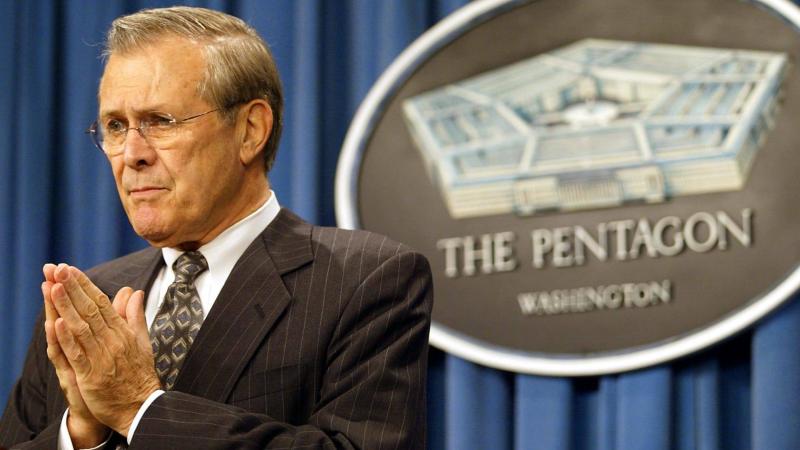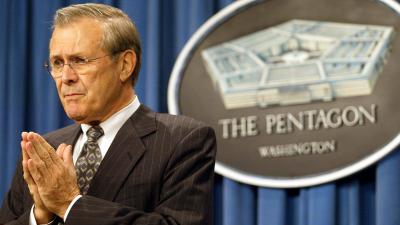Former U.S. Secretary of Defense Donald Rumsfeld passed away on Wednesday, just days before his 89th birthday, according to a statement from his family, which did not disclose the cause of death. Rumsfeld, a significant political figure within the Republican Party who served as Secretary of Defense twice, leaves behind a controversial legacy due to his oversight of the wars in Afghanistan and Iraq. The toll of the U.S. intervention in Iraq and Afghanistan was heavy, resulting in the deaths of 6,800 Americans, alongside hundreds of thousands of other fatalities and trillions of dollars spent.
In the family statement, it was noted, "History may remember him for his extraordinary achievements over six decades of public service, but for those who knew him well and whose lives were forever changed because of it, we will remember his unwavering love for his wife Joyce, family, and friends, and the integrity he brought to a life dedicated to his country." Rumsfeld served as Secretary of Defense twice, under Republican Presidents Gerald Ford from 1975 to 1977, and George W. Bush from 2001 to 2006.
**War in Afghanistan**
Following the September 11 attacks, Rumsfeld oversaw the U.S.-led coalition war in Afghanistan to topple the Taliban, which was then harboring al-Qaeda leader Osama bin Laden. By the first week of December 2001, the Taliban regime collapsed, according to the BBC. In 2003, Rumsfeld announced the end of major combat operations; however, despite dealing severe blows to the Taliban, the group gradually regained its capabilities and escalated attacks in 2006. In 2020, Washington was forced to negotiate with the Taliban, leading to a peace agreement for the withdrawal of U.S. and foreign troops from the country.
Rumsfeld's death comes as the Biden administration approached the withdrawal of the last American soldiers in Afghanistan, scheduled for September 11, after the war had cost the U.S. $2.26 trillion over two decades. The conflict resulted in the deaths of 241,000 people in Afghanistan and Pakistan. Meanwhile, U.S. combat operations resulted in the deaths of 2,442 American troops, six civilian employees of the Department of Defense, and 1,144 coalition soldiers. In 2019, The Washington Post revealed a project known as the "Afghanistan Papers," which included secret documents and memos written by Donald Rumsfeld, confirming that the true situation in Afghanistan was concealed from the American public. The Post stated that "the memos show that officials issued optimistic statements they knew to be false and concealed undeniable evidence that the war was unwinnable." In contrast, Rumsfeld defended his approach to the Afghanistan war in his 2011 memoir "Known and Unknown," asserting that the war was a fight against terrorism that liberated 25 million people from extremist groups through free elections, and maintained that two-thirds of al-Qaeda's leaders were neutralized.
**Invasion of Iraq**
While the American public was still focused on developments in the Afghanistan war, Rumsfeld oversaw the invasion of Iraq in March 2003 without obtaining United Nations approval, under the pretense that the Iraqi regime possessed weapons of mass destruction. Initially praised for leading U.S. forces to swiftly topple then-President Saddam Hussein, he faced criticism later as the war dragged on without achieving stability in the country, which cost Washington dearly, according to the Encyclopaedia Britannica. American generals blamed Rumsfeld for the failure of the war due to his insistence on invading the country with a minimal number of troops, ignoring military leaders' advice to increase troop levels to establish post-war stability, which hastened Iraq's descent into complete security chaos, especially after the disbandment of Iraqi security forces and military.
Rumsfeld was further blamed after images of U.S. soldiers abusing Iraqi prisoners at Abu Ghraib prison in Baghdad emerged in 2004. As opposition to the war in Iraq grew, especially after no weapons of mass destruction were found, the Republican Party suffered a heavy loss in the 2006 midterm elections. That same year, President George W. Bush announced Rumsfeld's dismissal from the Secretary of Defense position.
After the U.S. troop withdrawal in 2011, following a longer period than Rumsfeld expected, sectarian violence escalated in Iraq, worsening in 2014 with the rise of ISIS in the region, necessitating foreign military intervention again.
**Rumsfeld's Positions on the Iraq War**
In his memoirs, Rumsfeld defended the Iraq War, considering it "worth the price paid," and emphasized that he remained unrepentant about how he managed the conflict. He wrote that had Saddam Hussein's regime remained in power, the Middle East "would be a more dangerous place than it is now." Rumsfeld attributed mistakes made in the first year of the Iraq invasion to "lack of preparation before the invasion on how to manage the transitional political phase post-war," noting significant differences between the State Department's views and the Defense Department's perspectives on management. Rumsfeld stated that President Bush led a national security process that suffered from an incoherent decision-making mechanism and political drift that had a devastating effect on war efforts, blaming Bush for not doing more to resolve differences among senior officials in his administration.




